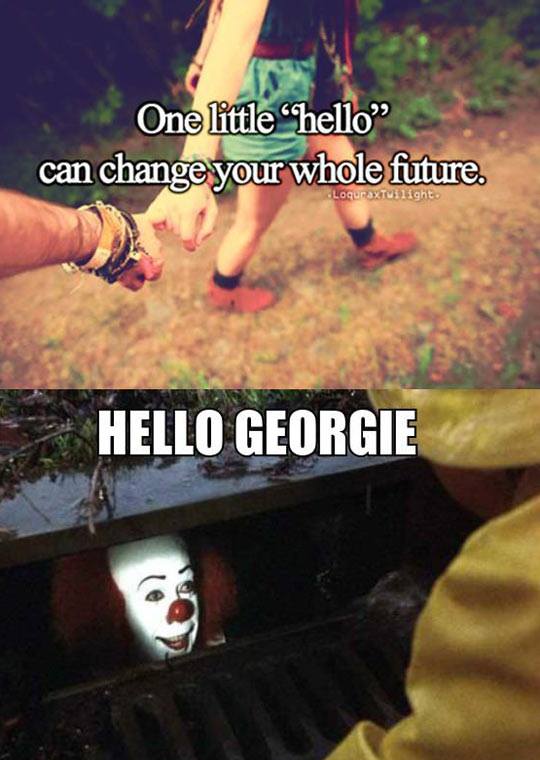The Mist

Earned Nihilism, or yet another reason to hate JJ Abrams. I still need seven more to complete the set.
Let’s start at the ending. No, really, this is the ending. I’m going to tell you the ending now. Do you understand what I am saying? I want to discuss this film, so if you’re going to see it, see it. Then come back. I do recommend the B&W version, which certainly helps the CGI visuals, which are less convincing in color. Okay. I’m going to say it now.
Ready?
Are you sure?

Because I’m not going to tell you yet. I have to explain what happens at the beginning.
No, not that beginning. We’re not here to talk about movies, we’re here to talk about my seeing movies. But not even that beginning, seeing the film in 2007 and knowing it was cool before everybody else. No, we’re here to talk about my modesty.
See, I had forgotten how right I was about that film, until the internet showed. All credit to the internet! As one does, I followed the path from one meme to another.
Getting to mock the denizens quotefix.com is just an added benefit. Oh, and please click on that link if you want to encounter someone with less grasp on reality than the adults confronted with Pennywise.
Think about how prescient I am → Have cake to confirm belief → Realize cake can justify anything → Have cake to forget →
The destruction of the platitudes that maintain the American middle class is not so far from the subject of The Mist, but that was not the train of thought in question. Instead, Mr. Tim Curry → It → Watch again → Pretty good → Belief in writers confirmed → Think about how prescient I am → Have cake to confirm belief → Realize cake can justify anything → Have cake to forget → Hey, what about The Mist, Steven King wrote that → Watch again…
Well, that holds up.
In a way I’m grateful, as I have been shoveling textual dirt on modern horror of late, and it’s important to appear impartial by occasionally like one movie out of four, even if it means going back eight years. I would actually say now that The Mist is a genuine classic, and possibly a career killer for Mr. Frank Darabont, as it was generally ignored at the time.
The Mist is a great technical filmmaking, whatever one’s opinion of ‘great’ or ‘wrong about Scott’s definition of “great”‘ may be. I was watching it on tape, and I found myself writing down times that happened. This is a high compliment, as my first thought at many scenes, you’re already doing that? There is not a lot of flab on the film, a feeling that it wants to tell you the story as best and as fast as it can. These are so often the same thing.
The film, for example, opens with the storm, and not an interminable exposition of characters who are sad about their spouse’s father disapproval during their brother’s secret tour in Iraq that turned out to be a wedding (don’t steal that!). Instead, the sheer normalcy (discussing whether photoshop can fix a damaged painting, going into town for shopping) creates tension by the audience’s awareness that this ain’t gonna last. See, middle class complacency, above.
8 minutes, and we see military vehicles speed by for what the characters think is just a mist coming in off the mountain, and at 11:34, the mist, an air raid siren, and Mr. Jeffrey DeMunn comes in saying ‘There’s something in the mist!’, and we’re off. The film does not wait around.
As it progresses, the film contains some of the best examples on how to do clichés, I would think via no small insight into human behavior. We’ve seen the Don’t Tell The Others Because We’re Not At The Part Of The Story Where We Do That Scene, but it works here because of a surprising insight into shame. Mr. William Sadler, after encouraging the bagboy out into the mist for his tentacled doom
(and this works itself, as Mr. Tom Jane (I’m allowed to call him that because I’ve seen Arrested Development), underlines the stupidity of even doing so, saying: ‘Fellas it doesn’t even matter about the generator, the food’ll keep without it.’ Their mission to restart the generator is just a matter of doing something when feeling helpless. Instead of having characters do something stupid for the story, the characters want to do something stupid)
says, ‘You should have said what you meant better’, in response to Mr. Jane’s having warned them. It’s a surprisingly believable bit of blame psychology, and like all good genre, seems to know humans better than the films that tell us how smart they are. The characters going crazy is not a cheap way to advance the plot because ultimately the outcome is irrelevant (see below). It’s happens because it’s what they want.
Another difficult bit to pull off is Ms. Marcia Gay Harden’s turn as the Lady Who Convinces Everyone This Is God’s Apocalypse. That’s not a cliché, but I’m running out of typographical gimmicks. This character seemed preposterous in 2007 (quite a bit less now, isn’t she?), but not to me. Ms. Harden is a fanatic, sure, but you can see her misanthropy burst through the cracks of her righteousness. Saving souls is just an unfortunate price to pay in order to see the ones she hates burn.
Maybe its appeal to me lies in its precedence of character desire and choice over story. As Ms. Laurie Holden fights off giant flying bugs, she’s screaming and utterly terrified. But she doesn’t freeze. She does it anyway. Likewise, Mr. Jane’s son, eight, and understandably out of mind scared, doesn’t do anything stupid. When he says, ‘Promise you won’t let them get me, daddy’, he’s not a whiner, just a scared kid. When a small group escapes the religious fanatics in the grocery store…
Hey we’re here! At the ending, talking about the ending
…they run out of gas, and Mr. Jane, with only four bullets, kills the other four in the car, including his son (the novelette simply ends, tentatively, at their unsure future). Considering it’s a father killing his son at the end of the world, there’s a surprising amount of restraint:
‘Got four’. ‘There’s five of us’. ‘I’ll figure something out’.
Having done this, and attempted believably to kill himself with the gun he knows to be empty (see human behavior, interest in superseding that of lazy plot gimmicks), Mr. Jane watches as the mist clears. The military arrives and Mr. Jane goes not a bit mad as they systematically destroy the monsters, effectively ending the end of the world.
I hate nihilism, and on the surface this is a nihilistic as it gets: if only he had waited two more minutes, or, more understandably, if only the filmmaker had made them wait two more minutes. Yet within the military convoy is a young mother with her children. This is the mother, who went into the mist herself (15:12) after asking the people in the store for help: ‘Is anybody going to help me? Won’t somebody here see a lady home?’ No one did. She made it. They didn’t.
At the time in my life, I totally agreed with the philosophy implied in that ending, that you never, ever stop fighting. I agree with it less now, and the film is slightly less effective to me now. Here’s the thing, whether you agree with the moral of the story, it has one. This darkness is earned via choice, not unlike Gone Baby Gone (hey, another better, seemingly but not actually nihilistic film from 2007 that was ignored!). Having the character choose, whether you agree or not, makes the film watchable more than once, which from what I can tell, people are finally doing with The Mist.

Why The North American Camarillo 12? There was a 10:15a showing. I have fond memories of that place, the default in case Agoura Hills was too lazy to put something up before noon. How on earth could anyone wait?
The extreme bleakness of this ending, yards darker than No Country and There Will Be Blood works because the characters chose to get there, even if they didn’t know where they were headed. These films pop up, again, via the internet train-of-thought-suckhole, as both came out, were detestable, and not so hot, respectively, and earned heaps of praise in 2007. This was the same year that The Mist couldn’t even make basic cable obscurity, what with all the violence and such.
The Mist works because it is earned nihilism. The characters made choices, believable choices, and there were outcomes. No Country half-fails because of its use of Deus Ex Chance, allowing Sr. Bardem to escape (and the reliance on the coin, isn’t fate fickle, except when it’s coincidentally what the author intends). There Will Be Blood fails because it’s incompetently filmed, lacks even marginal insight into human behavior, and characters can’t choose for the basic reason that they don’t as such exist.
This leads to minor point I was making above.
As we wind down this loveleadingallalongtohatefest, The Mist confers an additional benefit: indulgence of my enmity towards Mr. JJ Abrams. There’s a bunch of creatures in the mist: bugs (sort of), giant alienish birds that eat the bugs, half-alien or maybe not spiders and giant walkers that probably have tentacles. The point being, and this works surprisingly well in horror: we don’t know the mythology.
As with the first viewing of Night of the Living Dead (to whom this film’s B&W version pays reverent hommage), characters are trying to figure out what’s going on. There’s no rules to be learned, as there might be with vampires and zombies, that allows the audience to second guess the character’s behavior. We know what they know, and while this ain’t fair to genre filmmakers, this ignorance helps in enjoying the experience.
The terrible possibly worse than even There Will Be Blood which is saying something because it’s half as long Cloverfield stole every monster idea from this film. Given the infinite monkey quality of the internet, I doubt I’m the first to notice this. Given the fragility of my ego, I’m not going to check. So, in conclusion, JJ Abrams sucks (could stop there but) for stealing pretty much every idea for Cloverfield from this film. Hardly worth a mention. Can’t wait until you love the new Star Wars. It’s going make my told-you-so in seven years so much the more satisfying. Amazing. Now I’m right even before I know it.
$17.50
The Lonely Comments Section

 [logo]
[logo]
